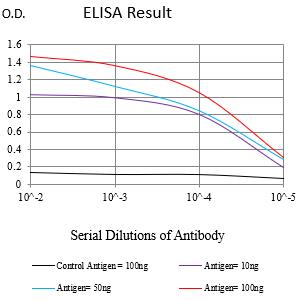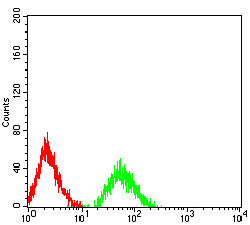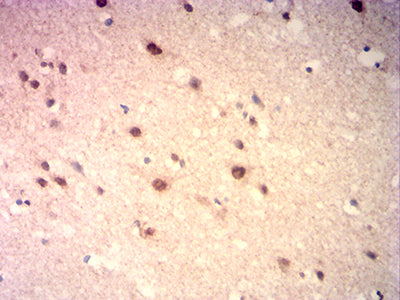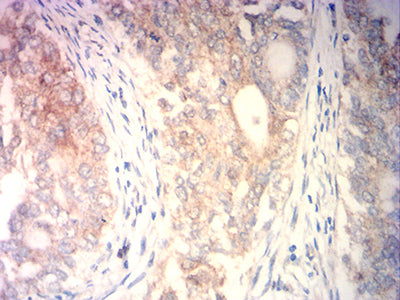



| WB | 咨询技术 | Human,Mouse,Rat |
| IF | 咨询技术 | Human,Mouse,Rat |
| IHC | 1/200 - 1/1000 | Human,Mouse,Rat |
| ICC | 技术咨询 | Human,Mouse,Rat |
| FCM | 1/200 - 1/400 | Human,Mouse,Rat |
| Elisa | 1/10000 | Human,Mouse,Rat |
| Aliases | CD271; p75NTR; TNFRSF16; p75(NTR); Gp80-LNGFR |
| Entrez GeneID | 4804 |
| clone | 8G8H10 |
| WB Predicted band size | 45.2kDa |
| Host/Isotype | Mouse IgG1 |
| Antibody Type | Primary antibody |
| Storage | Store at 4°C short term. Aliquot and store at -20°C long term. Avoid freeze/thaw cycles. |
| Species Reactivity | Human |
| Immunogen | Purified recombinant fragment of human NGFR (AA: 1-200 ) expressed in E. Coli. |
| Formulation | Purified antibody in PBS with 0.05% sodium azide |
+ +
以下是关于NGFR抗体的3篇参考文献的简要概括:
1. **文献名称**:*NGFR is a therapeutic target for melanoma stem cells*
**作者**:Boiko AD, et al.
**摘要**:该研究通过免疫组化和流式细胞术分析NGFR(p75NTR)在黑色素瘤中的表达,发现NGFR抗体可靶向癌症干细胞亚群,抑制肿瘤生长并增强化疗敏感性。
2. **文献名称**:*Targeting p75NTR in glioblastoma-derived neural stem cells*
**作者**:Truzzi F, et al.
**摘要**:研究利用NGFR抗体阻断p75NTR信号通路,证明其可抑制胶质母细胞瘤干细胞的自我更新和侵袭能力,提示其作为潜在治疗靶点。
3. **文献名称**:*p75NTR-dependent apoptosis in developmental and injury-induced plasticity*
**作者**:Park KJ, et al.
**摘要**:该文献综述了NGFR/p75NTR在神经发育和损伤中的作用,重点讨论了抗体阻断实验揭示的p75NTR介导的细胞凋亡机制及其在神经再生中的意义。
如需具体文献链接或扩展内容,可进一步提供研究方向或数据库检索关键词。
**Background of NGFR Antibody**
The nerve growth factor receptor (NGFR), also known as p75 neurotrophin receptor (p75NTR), is a transmembrane protein belonging to the tumor necrosis factor receptor (TNFR) superfamily. It binds to neurotrophins, including NGF, BDNF, and NT-3. playing dual roles in regulating neuronal survival, differentiation, and apoptosis. Unlike the tropomyosin receptor kinase (Trk) family, NGFR often induces apoptotic signaling in the absence of Trk co-activation, contributing to developmental pruning of neurons and pathological conditions like neurodegeneration.
NGFR is expressed in both neural and non-neural tissues, including certain cancers, where it can promote tumor progression, invasion, and therapy resistance. Its involvement in diseases such as Alzheimer’s, Parkinson’s, and cancer has driven interest in targeting NGFR for diagnostics and therapeutics.
NGFR antibodies are critical tools for detecting and studying this receptor’s expression, localization, and function. They are widely used in techniques like Western blotting, immunohistochemistry, and flow cytometry. Additionally, therapeutic NGFR antibodies are being explored to modulate neurotrophin signaling, block pro-survival pathways in cancer, or deliver cytotoxic agents in targeted therapies. Recent research also highlights their potential in addressing nerve regeneration and pain management. As NGFR’s context-dependent roles become clearer, antibodies remain pivotal in unraveling its mechanisms and advancing clinical applications.
×